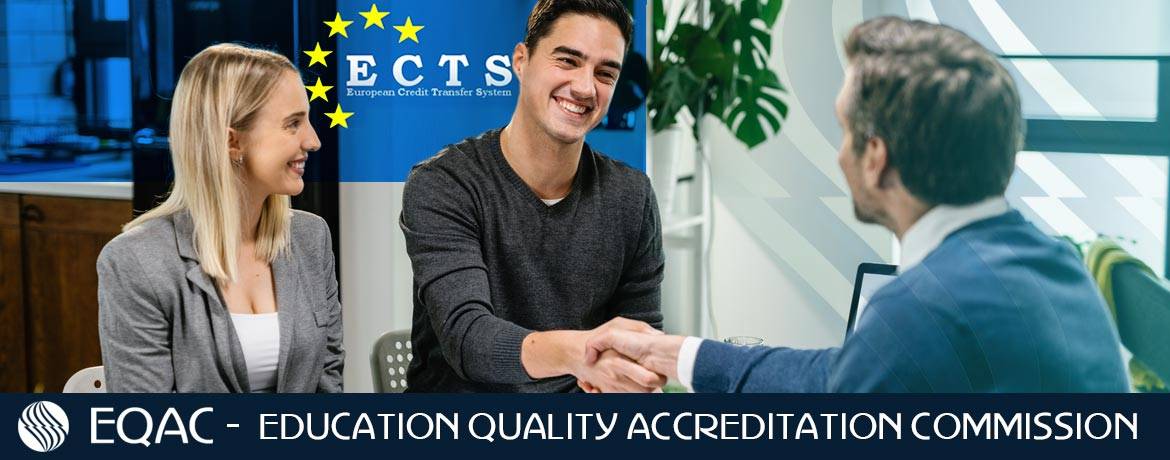Regulations for ECTS Credits
Education Quality Accreditation Commission

REGULATIONS FOR THE CERTIFICATION OF ECTS CREDITS
These regulations are established to ensure the integrity of the Education Quality Accreditation Commission and all the services provided. These regulations are meant to be effective and their interpretation is based on the assumption of ethical values, integrity and a non profit spirit from each of the members of the Education Quality Accreditation Commission.
These premises may evolve to address new situations or services upon proposal from the members of the Education Quality Accreditation Commission. Proposals will be accepted by the President from individuals or groups, including students, staff, faculty, members of the general public, governmental agencies, and other institutions or organizations. The President reviews any proposal and acknowledges its responsibility to provide a reasonable and impartial review. Proposals should be sent to the EQAC Secretary.
1. Regulations for the Education Quality Accreditation Commission members.
2. Regulations for the Accreditation of Educational Institutions.
3. Regulations for the Validation of Degrees and Diplomas.
4. Regulations for Conferring a Doctor Honoris Causa of Excellence.
5. Regulations for the certification to issue ECTS Credits.
5.1. The ECTS Credits Certification
The Education Quality Accreditation Commission may certify the qualification of an institution to issue ECTS credits for any course, training or program of study. In order to obtain this qualification to issue ECTS credits the institution must demonstrate that the corresponding learning outcomes and hours of study hours for the course, training or program of study have been met.
5.2. The ECTS Credits Certification Process
Any educational institution that wished to issue ECTS credits must demonstrate through the Application for Accreditation (Self Assessment Report) that several of the standards set forth by the Education Quality Accreditation Commission are met. In order to apply for the certification to qualify for issuing ECTS credits, the school or institution must:
- Download and fill out the EQAC Application for Accreditation (Self Assessment Report).
- Contact the EQAC Secretary to ensure eligibility for this certification.
- Pay the validation fee of 900 Euros. There are no refunds of this fee.
EQAC will apply the same procedures described in the process of educational accreditation with some limitations and adaptations resulting from the European Higher Education Area guidelines about the ECTS credits.
5.3. The ECTS Credits Certification Required Standards
The school or educational institution does not need to meet all the requirements for a complete accreditation. 12 of the 26 standards described in the application for accreditation are required. The standards necessary to qualify for issuing ECTS credits are:
- A1. Identification
- A2. Legal authorization
- A3. Accreditation, recognition and references
- C1. Courses / Programs description
- C2. Hours of study
- C3. Course objectives or expected learning outcomes
- C4. Course contents & materials
- C7. Teaching methodology
- C9. Teachers proficiency
- C10. Assessment & Evaluation
- C11. Certificate or diploma
- C12. Transcript or equivalent
Once the application is received, the EQAC will guide the educational institution to adapt and meet the European Higher Education Area guidelines in order to issue the ECTS credits. Click here to know more about the required accreditation standards.
5.4. Parameters for the ECTS Credits Certification.
The certification to issue ECTS credits is exclusive for European educational institutions.
5.4. ECTS Credits Certification.
The certified school will receive an evaluation report noting any improvement or adaptation requirements to meet the European guidelines concerning the ECTS credits. The school will also receive a certification diploma once the whole process has been satisfactorily accomplished.
The certified educational institutions may be included in the list of accredited institutos from the Education Quality Accreditation Commission provided that the corresponding yearly maintenance fee is paid.
Education Quality Accreditation Commission
Click to see more about:


